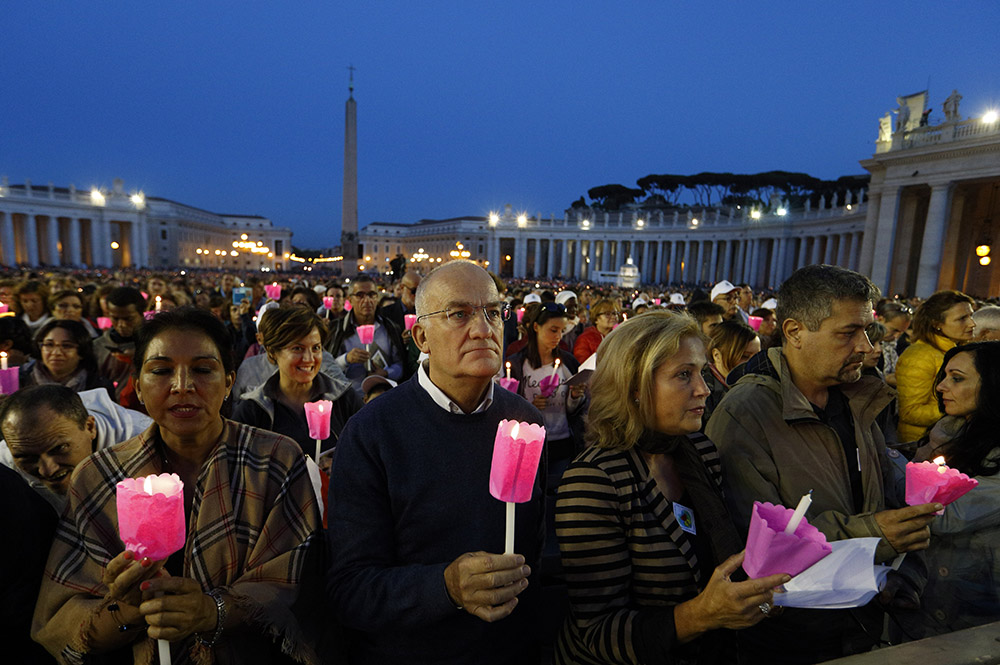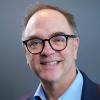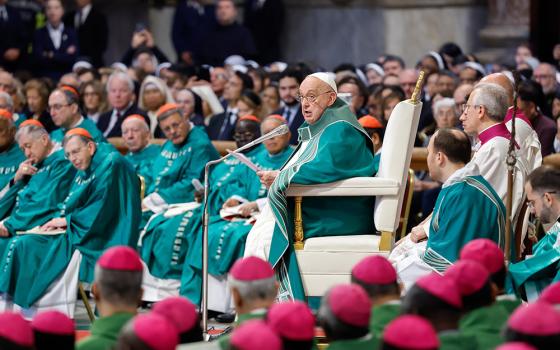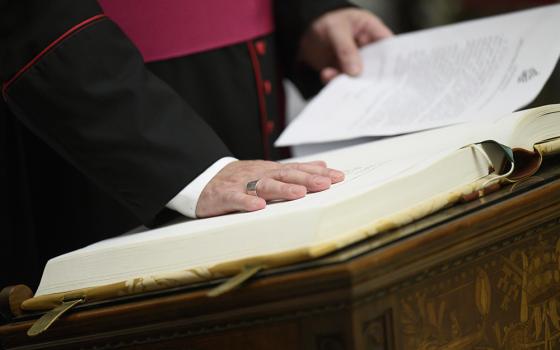
Pope Francis delivers his homily during the closing Mass of the synod on synodality in St. Peter's Basilica at the Vatican Oct. 27, 2024. (CNS/Lola Gomez)
The Roman Catholic Church is at a crossroads and today 133 men have a choice.
Will they continue down a path blazed by the first Latin American pope toward a more inclusive, open, transparent church where lay men and women hold positions of authority in the church's administrative body?
Or will they pull back from Pope Francis' initiative known as synodality?
No contender has emerged as a front-runner as the cardinals enter the Sistine Chapel. But one topic has arisen as a flashpoint, a point agreement for many and a bit of unease for a few others: how far the church should go to advance synodality.
Synodality has repeatedly been a topic discussed in the general congregations leading up to the conclave, according to Vatican briefings. Individuals familiar with private discussions tell National Catholic Reporter journalists that there is a significant bloc of cardinals who support synodality and can vote in the conclave.
That might not be a surprise, given an investigation by NCR that found the overwhelming number of cardinal electors —106 — have embraced Francis' synodality. The findings can be found in NCR's interactive database of the cardinals eligible to vote in the conclave, according to an NCR analysis of the views and backgrounds.
Among those apparently pro-synodality cardinals, a few stand out, including an American. Cardinal Robert Prevost, 69, a Chicago-born Augustinian friar who has spent most of his life outside of the shores of the United States.
Prevost, 69, heads the influential Vatican Dicastery for Bishops, the office tasked with advising the pope on bishop appointments around the world, and knows the workings of the Curia. But his vocal advocacy of Francis' emphasis on synodality could win him many votes.
In interviews, Prevost connects synodality's efforts to make the church's structures more inclusive and participatory as key to addressing polarization gripping the church.
Another cardinal in the synodality camp is Cardinal Mario Grech of Malta. He served as secretary-general of the Synod of Bishops and oversaw the 2021-24 synod on synodality. In comments on synodality's ties to the 1962-65 Second Vatican Council, Grech defined a synodal church by three words: "communion, participation and mission."
Synodality is also the key factor defining these meetings as a Pope Francis conclave, one of the largest in church history. Francis elevated 92 of those cardinals who support synodality. In comparison, seven cardinals have expressed opposition to synodality principles; of those, three were made cardinals by Francis, three by Pope Benedict XVI and one by Pope John Paul II.

Members of the General Secretariat of the Synod, including Cardinal Mario Grech (at center and onscreen), attend a news conference at the Vatican Oct. 26, 2024. (CNS/Lola Gomez)
A synod participant, Fr. Eamonn Conway, said he worries whether Francis' successor will continue the late pope's efforts.
"It's conceivable but unlikely that a new pope will change that direction; there's a wind of change behind [the church]," said Conway, a diocesan priest from Tuam, Ireland, who participated in the synod on synodality.
A factor that has impressed church leaders is the outpouring of love for Francis and the reigning popularity of his message of mercy. Because of that, Conway thinks it is a sign that synodality is likely here to stay.
A hallmark of Francis' papacy, synods are worldwide conversations among lay and religious Catholics in which all participants discuss the ways church teaching affects them day to day, and how the church can better meet them where they are.
What was once, under other popes, a scripted, hierarchical, monthlong gathering became under Francis a true grassroots dialogue, beginning at the parish, then diocesean, national and eventually global level. The process culminated with major summits in Rome.
In his 12-year papacy, Francis initiated the synod on the family (2014-15), synod on youth (2018), synod for the Amazon (2019), and synod on synodality (2021-24).

People hold candles during a prayer vigil for the Synod of Bishops on the family attended by Pope Francis in St. Peter's Square at the Vatican Oct. 3, 2015. (CNS/Paul Haring)
The synods conclude with final documents outlining widely agreed-upon desires for the church, some of which call for real reform. In the final report of the synod of synodality in October, several concrete actions for the church were called for, such as involving laity in the selection of Catholic bishops and allowing women greater roles in church leadership.
So important was it to Francis that these decisions come to fruition and for the synod to maintain its momentum, that while he was on his hospital bed in March, he approved a three-year plan to implement the synod's conclusions.
Even in his final months, Francis proved his unwavering desire for synodality to remain a priority for the Catholic Church.
There are still some who seem resistant to the process, Conway noted. The concept was conspicuously absent from high-profile tributes to Francis: Cardinal Giovanni Battista Re didn't mention it in his homily during Francis' funeral, nor did Vatican secretary of state Cardinal Pietro Parolin — once considered the papal front-runner — in his homily the day after the funeral.
Cardinal electors noticed Parolin's failure to mention synodality, and it was cited by some familiar with the thinking of cardinal electors as a reason that the former Vatican secretary of state's star has fallen.
Advertisement
While Parolin's omission of synodality was widely interpreted as a lack of enthusiasm for continuing down this path, other older and more traditional cardinals have been more candid about their opposition.
In a dramatic April 30 session of the seventh pre-conclave plenary assembly, Cardinal Beniamino Stella publicly criticized Francis for what he described as a break with "long-standing tradition" in the Catholic Church, America magazine reported.
Though Stella is ineligible to vote in the conclave because he is over 80, he joins several other Italian cardinals who recently have been outspoken, likely in the hopes of influencing cardinal electors, about their desire to slow the reforms Francis started.
Stella, who is campaigning for Parolin for pope, according to Italian media, suggested the late pope was "imposing his own ideas" by divorcing church governance from ordination when Francis permitted lay men and women to hold positions of authority in the church's administrative body.
Francis' ideas or not, a great majority of those who participated in the synod agreed with them.
Those who were able to vote on the final document from the synod on synodality found broad agreement regarding the synod's propositions: Most sections received 90% votes of approval, with all paragraphs receiving the two-thirds votes required for approval.
Anna Rowlands, a professor of Catholic social thought and practice at Durham University in England, who participated in the synod on synodality, said the fact that the subject of synodality has become a source of disagreement among the cardinals is to be expected.
"It tells us that Francis opened a process of real significance, that the cardinals now need to decide if they want to make this process their own," Rowlands said.
Conway is an unabashed cheerleader for a synodality-embracing pope.
"We need somebody who will be able to reform the Vatican, to continue the reforms that Pope Francis undertook," Conway said.
The National Catholic Reporter's Rome Bureau is made possible in part by the generosity of Joan and Bob McGrath.









